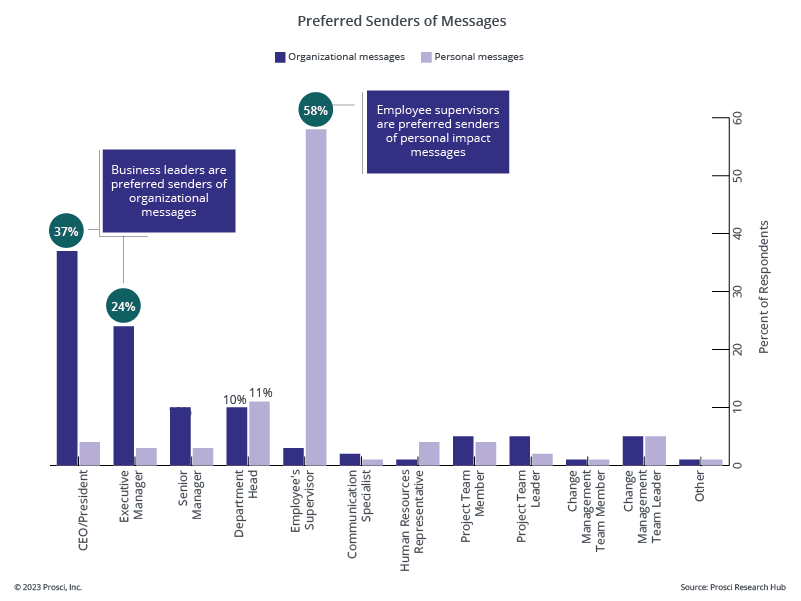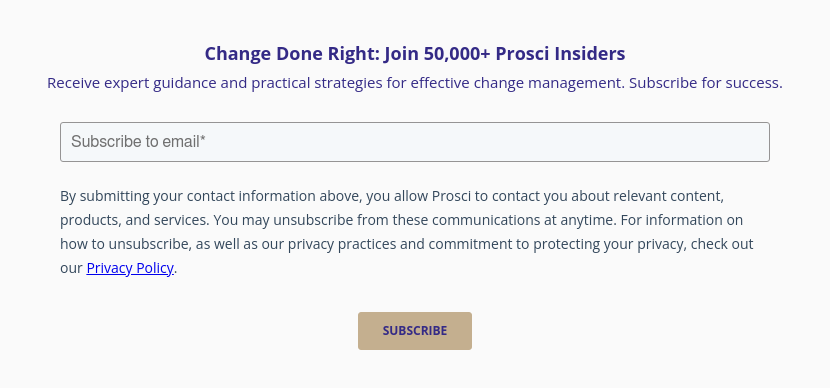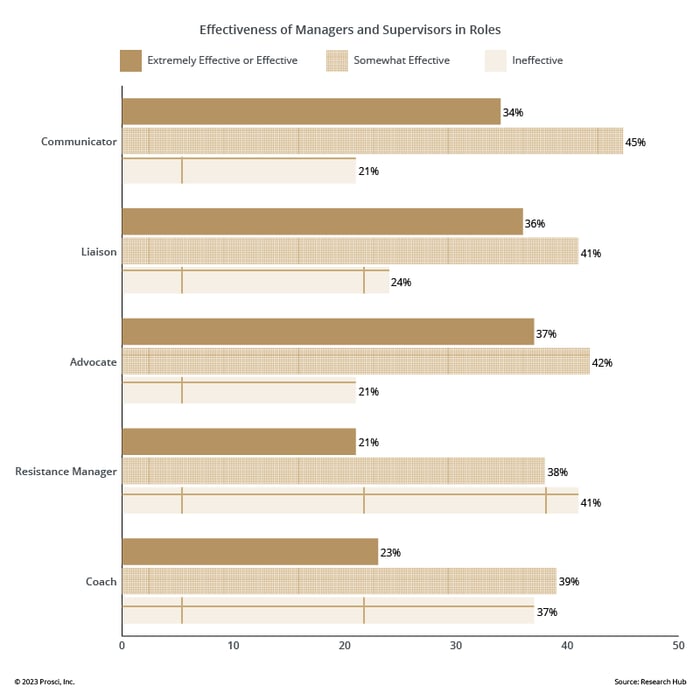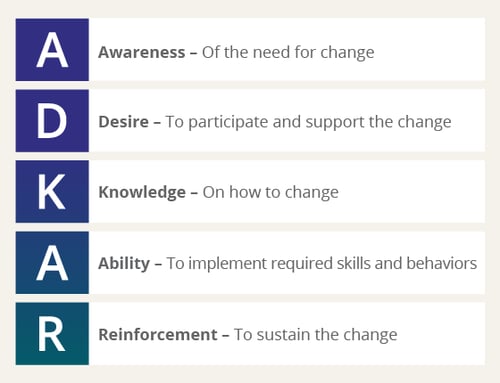5 Tips For Developing People Managers as Leaders of Change
4 Mins
Updated: August 13, 2025
Published: July 22, 2025

As a people manager for over 35 years, I've seen first hand how critical managers are to successful organizational change. In fact, Prosci's latest Best Practices in Change Management research continues to rank people manager engagement among the top contributors to successful change outcomes.
When you enable people managers with the right knowledge, tools and support, they can grow into well-equipped allies who will engage with their teams and help move organizational changes forward. Here are five proven tips to help them succeed:
1. Build Support for the Change
The first step in engaging people managers as leaders of change is getting them on board. People managers must support a change before they can successfully lead their teams through it. From an ADKAR perspective, this means ensuring managers have sufficient Awareness of the need for change and Desire to participate before engaging their direct reports.
I learned this lesson early in my career: Managers operate at the critical interface between senior leadership and front-line staff. We're often the first people employees turn to for information about organizational changes and how they'll affect their roles. That's why your change management plans need specific elements aimed at building support with people managers.
The Communications Plan should have a section focused on people managers, explaining why the change is happening, the benefits, and the nature of the change from the manager's perspective. These communications should start very early in the project lifecycle to ensure adequate time before people managers are asked to communicate with their teams.
Research shows that communications are most effective when they come from preferred senders. In the case of people managers, messages should come from leadership and the people manager's direct supervisor. Two-way communication is essential to allow for exchanges and feedback.

Specific activities in the Sponsor Plan should also focus on people managers. Their leaders, and in some cases the managers themselves, are part of the coalition of leaders needed to drive the change forward.
From my experience, resistance management planning for people managers is crucial. In Prosci's most recent benchmarking study, 42% of participants cite mid-level managers as the group most resistant to change. This isn't surprising, we often reconcile our reactions to change while supporting our teams through theirs.

2. Share the Role You Expect
Let's be bold here: managing team members through change is as fundamental as managing performance. Yet, while organizations invest significantly in training managers for performance management, we often overlook preparation for leading change.
It's critical to tell people managers how important their role is in driving successful change. When people managers don't understand this, they're more likely to abdicate their responsibilities, feel unprepared, or resist the change.
Prosci research identifies five key roles of people managers during change, or CLARC:
- Communicator – to deliver key messages about the change
- Liaison – to enable two-way communication between employees and the project team
- Advocate – to demonstrate support for the change
- Resistance Manager – to identify resistance and help remove individual barriers to adoption
- Coach – to provide training, information and support employees need to adopt and use a change
3. Build Competencies
Leading change is a personal competency that people managers can build, but it isn't necessarily natural. Even great managers can struggle during times of change. As someone who's coached countless managers through transformations, I've seen how crucial it is to invest in change leadership development.
Participants in our benchmarking research cite the Coach and Resistance Manager roles as the two roles people managers struggle with most. These CLARC roles often represent tasks and challenges outside managers' general skillsets. Unfortunately, only 35% of study participants say they provide adequate training, preparation and support to managers for their roles in change.

When organizational leaders recognize that “leading change” is a personal competency that managers can build, organizations can begin providing training and professional development opportunities for this critical group. During times of change, having people managers who can lead their teams through change is central to success.
4. Provide Tools
People managers need practical tools to help their people through changes. The ADKAR® Model is one of the most powerful tools you can provide. By breaking down the change process into simple outcomes—Awareness, Desire, Knowledge, Ability and Reinforcement—ADKAR gives people managers an approach to understand how individuals experience change.
ADKAR is equally powerful as a tool for identifying where people are experiencing barriers to change. People managers who can put ADKAR into action will have more productive discussions, be able to isolate issues and problems, and ultimately be in a better position to support their people through the change process. And, when changes are better managed at this level, morale and productivity improve.
 People managers need a number of additional tools from change managers as they serve as leaders of change. A few suggestions include:
People managers need a number of additional tools from change managers as they serve as leaders of change. A few suggestions include:
- Communications materials
The role of the Communicator is one of the five key roles of people managers during change, and it's repeatedly identified in Prosci's Best Practices in Change Management research. But what messages do they need to communicate and when? Change managers need to enable people managers with coaching on effective communication and simple but comprehensive communications materials that include the information they are expected to convey to their direct reports. - Resistance management tools and tips
The role of the Resistance Manager is another key role of people managers during change, and the one that Prosci research participants identified as being most difficult. Offering tools and tips that help people managers know what resistance might look like, where it is likely to show up, and how to identify root causes of resistance is beneficial. Tips and actions for mitigating resistance with impacted people and groups are built into the Prosci 3-Phase Process, along with effective tactics for addressing resistant behaviors when they persist. - Guidelines on how to measure performance
Changes are only successful when employees do their work in a different way, as prescribed by the project or change initiative. People managers are in the best position to identify whether changes are being adopted and used. You can enable them with tools and metrics for understanding whether people are complying with the new way of working.
5. Provide Support
Support is critical when people managers take on their new "leader of change" role. Some tasks and responsibilities are difficult and unfamiliar, and they need outlets for guidance.
I've found peer support networks invaluable—creating safe spaces where managers can discuss their concerns about specific changes and share experiences. It's also helpful to connect people managers to experienced peers or subject matter experts who can provide insights and feedback.
Your support as a change practitioner extends well beyond classroom learning. Consider ongoing coaching and mentoring—these one-on-one sessions are often where the real transformation happens. When we invest in developing strong change leaders, we're not just enabling current changes—we're building change capability for the future.



